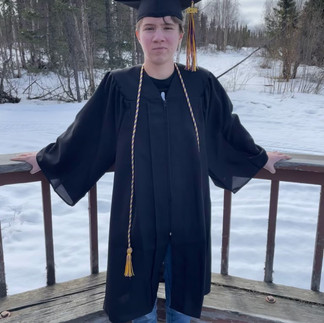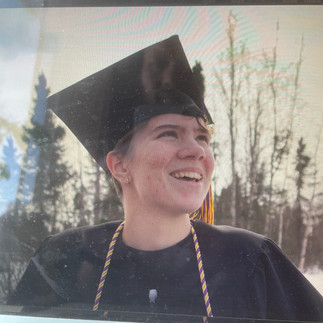Stages of Graduation
- Prof C
- May 19, 2024
- 7 min read
by Philip
“Where love stops, power begins, and violence, and terror.” -Carl Jung
Ash and I are now in the process of wrapping our first year here at Kaltag School, and our
intention to grow learn, and challenge ourselves has been meet with a plethora of
opportunities to do just that. While our work is just beginning, it seems many back home are
still struggling to understand just why we moved to a remote village in Bush Alaska, given how stable and predictable our lives were back in Central Texas. To be honest, there are days when Ash and I ponder that same question. Ash had secured her dream job as a librarian and had done well to incorporate herself into the library there at Killeen High School, working with two people, of whom she had grown quite fond. I, myself, also had a job I loved, teaching college students the complexities of politics and social organization, while also working as an author and consulting on the side. Most notably, I had developed a system to evaluate, manage, and develop new and experienced teachers in a way that does not threaten their professional confidence. In truth, I’m quite proud of the system I designed and the work I was doing. Given the move, however, I have mostly shelved it.
Our kids, however, were a bit different. Jadyn was knee deep into her senior year and doing her best to lay low and not be seen. Emily was discovering herself a bit as a sophomore but
continued to run into complicated hurdles of prejudice and ignorance. Josh was struggling
through eighth grade, where most of his peers were jacked up on digital highs and unrestricted testosterone that most parents willfully condoned. Avery had just entered middle school and was beginning to understand the mean girl phenomenon that, too often, runs amuck in middle and high school. Meanwhile, the focus in each class seemed to be mostly test prep and only scratching at behavioral management. More and more, the classroom had become a controlled form of chaos where the primary goal was to have each student not drop into a classification that requires more paperwork. That being the case, a student that is not at risk of failure, or a behavior problem, is often ignored and left to the side while most of the attention, resources, and energy of school staff is directed to those students who require more attention. Meanwhile, schools across the United States still propose the implementation of relationship-centered learning.
The reality is that we all struggle with relationships. In our personal lives. Within our faculty
arrangements. With our students. We struggle because all relationships require vulnerability
and accountability. These are not just suggestions or nice things to have, they are requisite for any relationship to emerge that is more than a social arrangement constructed by an imposed hierarchy of tradition, status, or degree. In the classroom, we often fail to build relationships with our students because we too often buy into the nonsense that we, as educators, have it all figured out. After all, our job is to prepare our students to pass a test which allows them the opportunity to get a degree and achieve success. We are cold instructors, managed by bureaucrats who are controlled by the highest bidder and most savvy political operator. It is no wonder teachers across the nation enter the profession to make a difference and leave just as quickly as they entered.
In his book, The Undiscovered Self, Carl Jung writes, “A human relationship is not based on
differentiation and perfection, for these only emphasize the differences or call forth the exact
opposite; it is based, rather, on imperfection, on what is weak, helpless and in need of
support—the very ground and motive of dependence. The perfect has no need of the other, but weakness has, for it seeks support and does not confront its partner with anything that might force him into an inferior position and even humiliate him. This humiliation may happen only too easily where idealism plays too prominent a role.”
In this excerpt, Jung lays forth precisely the necessary foundation of proper relationship;
the acknowledgement of weakness, a reliance on others, all while avoiding humiliation. While the recipe may seem easy, it is anything but. Primarily, because we have inundated American students for years with messages of personal perfection, collective idealism, and self-reliance/independence, all concepts that counter proper relationships. For me to enter a
relationship, I must humble myself to the influence of another and then ask them to allow me
to influence them in return. We then must expose each other’s flaws, blemishes, and
shortcomings without damaging their ego or self-confidence. This is precisely the foundation of consent required upon, in which any right may be properly transferred.
As we enter graduation season, a host of evidence can be witnessed to this reality, as
graduating classes across the nation will be lined up, celebrated, and told they are bound for
great things. Each class will sit and listen to speeches crafted to inspire and motivate individuals to become their best, to pursue great things, to “shoot for the moon.” Each one will be consumed in the traditional garb of accomplishment. Each one bestowed their relative cords and stoles of success. Each one will be paraded across a stage dressed up for the occasion. And each one will be a scared, terrified, weak individual without a clue as to what the next year has in store. We have sold them a lie, one based in tradition and honor, but a lie nonetheless.
The truth is far more complex and nuanced. The truth is that many of us who passed our exams and walked our stages will not find success and happiness. The truth is that many sitting within the stage parties, cloaked and hooded with all their accomplishments, have not yet found real success or real happiness. Because the truth is that human relationships are hard and they do not solely depend upon our strength, but also our willingness to acknowledge and admit our shortcomings. They require that we see into the person beyond the mask they have crafted and work to authentically see them. To want to understand them. To want to better them. And to need to learn something from them.
This week we have been making preparations for our own little graduation ceremony of five
students who will be walking the stage here in Kaltag. In the process, I have been able to
witness a new side of my students. A student whom I could not get to sit and complete an
online assignment sat for over an hour with me to prepare for his driver’s exam. A student who will not sit for five minutes in class during a lecture or an assignment, spent 45 minutes
cranking up a basketball goal because he was determined to complete the task. Several
students uninterested in science worksheets figured out how to shift an entire row of bleachers by applying principles of physics (granted they couldn’t explain in detail why what they did worked…in technical terms). Each example above provided a new insight, a new glimpse into an otherwise frustrating student, each student marked as at-risk and low performing. Though we continue to throw all kinds of acronyms at these students (RTI, IEP, BIP, etc.), I wonder if our fundamental misconception is simply in that we have not provided students the opportunity to help someone beyond themselves. To pitch in. To provide something of value in a meaningful way to the collective. Each of the examples above required no small amount of effort on the part of my students, effort that I have not been able to motivate in the classroom. So why did it work this past week? Maybe the answer isn’t any more complicated than because I needed help and I asked.
During my first year of teaching, almost 20 years ago at Harker Heights, I was diagnosed with
Stage 3 Hodgkin’s Lymphoma. Though I did not tell many of my colleagues of my condition, I was honest with my students about what I was facing and the difficulties each day would bring. Over the course of that first year, though I had some rough students, some of whom I was warned about, each one-on-one way or another rose to the task of helping me out. When I had to bail on class to go vomit…they remained calm and did not bring attention to the unmonitored class. When I fell asleep in class (true story) after a chemo appointment, they dutifully watched the door and stayed on tasks to ensure no one noticed (they did this without me asking…it’s actually a funny story).
It is often in our times of authentic vulnerability (which does need to be differentiated from
purposefully displayed vulnerability and weakness that many like to tout as part of their
constructed mask) that those around us are able to rise and become something more than they would be independently. More than what they are when they are isolated and alone.
Recently, I ran across a national study which asked students, ages 14-23, if they believed their
actions mattered. Only about half of the respondents said yes. Of that same group, they were also asked if anyone cared about what the actions they took. Again, about half responded in the affirmative. We are about to line the nation’s seniors up and parade them across a stage when half of them don’t even think they matter. We are at crisis levels and no curriculum, law, or standardized test is equipped to address that. We must engage in relational teaching. We must confront our weaknesses.
One such senior in this class just happens to by my eldest daughter, Jadyn. Words cannot
express how proud Ash and I are of the woman she is becoming, of the person she wants to be, of the good she wants to offer. Through our many conversations, I have found myself
disheartened in the moments where Jadyn felt her actions didn’t matter. The times she could
float through school with only a few individuals seeing her, acknowledging her, seeing her
potential, and asking her for more. To those teachers (I hope you know who you are) I am
eternally grateful. Jadyn is now at the end of her time in public school, and she has set her
course to be a criminal psychologist. Why? Because those are the people most misunderstood, most in need. It is in them, that our greatest weaknesses manifest. Yes, our weaknesses, as human beings, shared weaknesses, shared vices, shared pain.
Over the next few years, Jadyn will continue her education with a new crop of college
professors. My hope is that they will be professors of influence, of substance, of relationships. In the meantime, Ash and I will continue our work here in Kaltag and see what may come, if we are able to more perfectly follow our noble inclinations, in spite of continued oversight and micromanagement to the contrary.
***
And also featured in this year's graduation ceremony, is Joshua, who has finished up his 8th grade year. Hard to believe he'll be in high school next year. He too, is growing into a pretty awesome young man. In the photo below, he's standing with our two kindergarten graduates as well.















I'm intrigued by the faint reflection of "dad" in the picture of Jadyn pointing to her name in beads! Almost like he is there, looking on, watching after her as she steps boldly into her future!!